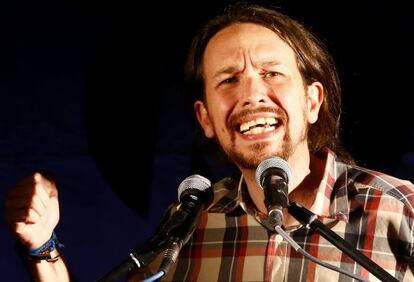Podemos makes ousting Popular Party its priority in brokering deals
The fragmented scenario after Sunday’s elections is forcing groups to seek agreements Socialists begin sounding out both Pablo Iglesias’ anti-austerity party and Ciudadanos

In the wake of the May 24 local and regional elections, which saw the Popular Party (PP) lose many of its absolute majorities, anti-austerity party Podemos has made it a priority to eject the conservatives from power wherever it can.
This overarching goal will guide any agreements that Podemos makes with other parties to secure more joint seats than the PP in city councils and regional assemblies.
The Socialists have told both Podemos and Ciudadanos they have no problem negotiating “principles and ideas”
While Podemos leader Pablo Iglesias will not yet openly talk about coalition-building – his group ran on the premise that all mainstream parties are equally tarnished by corruption and must be kicked out of office – recent statements suggest a potential deal with the Socialist Party (PSOE).
“We are going to put forward a program that Socialist voters are going to be enthusiastic about,” said Iglesias on Monday during a television interview on La Sexta.
Iglesias feels the Socialists will be his party’s main partner in his quest to oust the PP, either by offering support where the PSOE did better or by requesting it where Podemos-affiliated groups performed strongly, such as in the city of Madrid.

Podemos did not run everywhere as a stand-alone political force, instead forming part of leftist blocs. These include Barcelona en Comú, whose leader Ada Colau is poised to become the next mayor of Barcelona following her upset victory on Sunday.
Deals between the Socialists and these left-wing groups could propel the PSOE to power in the regional governments of Castilla-La Mancha, Extremadura and Asturias.
Regarding the widely expected possibility of an agreement between the Madrid Socialists and Ahora Madrid, a leftist bloc supported by Podemos, Iglesias said that “there should be agreements.” The PP’s mayoral candidate, Esperanza Aguirre, attracted slightly more votes than Manuela Carmena of Ahora Madrid, but a leftist alliance could leave her out of the mayor’s office.
José Manuel López, the Podemos nominee to the Madrid regional premiership, has not ruled out the possibility of an alliance with the Socialists to prevent PP candidate Cristina Cifuentes from taking office. The PP obtained 48 seats in the regional assembly, followed by the PSOE with 37, Podemos with 27 and Ciudadanos with 17.
Despite the likely deals, Iglesias is insisting that he will only come to agreements “with those who are ready to make a U-turn on the policy of cuts, which has proven to be a complete failure, and who show a commitment to zero tolerance against corruption.”
If agreements are reached, minority groups will help get mayors and regional premiers invested by either abstaining or voting yes at the investiture session. This, it is hoped, will prevent more situations like the one currently playing out in Andalusia.
The southern region held early regional elections but still lacks a premier after opposition parties refused to invest the Socialist Party’s Susana Díaz. Podemos has also failed to support the winning party, and is demanding that the Andalusian government break off relations with banks that evict people from their homes, a requirement with which Díaz is so far refusing to comply. It is not yet known if Podemos will extend this demand to the other regions.
Meanwhile, the Socialists on Tuesday began sounding out both Podemos and Ciudadanos, another emerging party that did well at the polls and could hold the key to many positions of power.
Pablo Iglesias says he will only negotiate with those “who are ready to make a U-turn on the policy of cuts, which has proven a complete failure”
But so far, the PP and PSOE have been making generic offers. The Socialists have told both Podemos and Ciudadanos that they have no problem negotiating “principles and ideas.”
Ciudadanos, for its part, is demanding that parties sign its own list of anti-corruption measures before offering any kind of support. These include the need to introduce party primaries to make candidate selection more transparent. For now the PP refuses to do this, although it will likely need Ciudadanos’ support in the Madrid regional assembly if it wants to beat a likely coalition between the PSOE and Podemos.
Prime Minister Mariano Rajoy of the PP said he wants to “offer transparent and stable pacts in places where there is not a sufficient majority to govern,” and insisted that the leader of the most-voted party should be the one to be invested.
Tu suscripción se está usando en otro dispositivo
¿Quieres añadir otro usuario a tu suscripción?
Si continúas leyendo en este dispositivo, no se podrá leer en el otro.
FlechaTu suscripción se está usando en otro dispositivo y solo puedes acceder a EL PAÍS desde un dispositivo a la vez.
Si quieres compartir tu cuenta, cambia tu suscripción a la modalidad Premium, así podrás añadir otro usuario. Cada uno accederá con su propia cuenta de email, lo que os permitirá personalizar vuestra experiencia en EL PAÍS.
¿Tienes una suscripción de empresa? Accede aquí para contratar más cuentas.
En el caso de no saber quién está usando tu cuenta, te recomendamos cambiar tu contraseña aquí.
Si decides continuar compartiendo tu cuenta, este mensaje se mostrará en tu dispositivo y en el de la otra persona que está usando tu cuenta de forma indefinida, afectando a tu experiencia de lectura. Puedes consultar aquí los términos y condiciones de la suscripción digital.








































